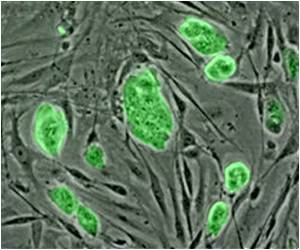Commensal bacteria is loaded in the human gut – good microbes that, among other functions, help the body digest food.

Now, researchers may finally understand an important mechanism that keeps this friendly truce intact – a finding that may lead to the development of new therapeutic strategies for such chronic diseases.
Gregory F. Sonnenberg, PhD, research associate in the Department of Medicine, Gastroenterology Division, and the Institute for Immunology at the Perelman School of Medicine, University of Pennsylvania, with postdoctoral researcher Matthew Hepworth, PhD, report in Nature that innate lymphoid cells (ILCs) directly limit the response by inflammatory T cells to commensal bacteria in the gut of mice. Loss of this ILC function effectively puts the immune system on an extended war footing against the good, commensal bacteria – a condition observed in multiple chronic inflammatory diseases.
ILCs are a class of rare immune cells that were first described a few years ago. Previous research has implicated these cells in regulating immune responses in the intestine, mostly through their ability to secrete immune-activating cytokines. But until now, researchers have had a hard time studying ILCs because it hasn't been possible to selectively eliminate them in the context of an otherwise intact immune system.
Sonnenberg, Hepworth, and their colleagues deleted a protein called RORt, required for one class of ILCs, in mice. RORt-deficient animals had exacerbated T cell responses against commensal bacteria and systemic inflammation. In contrast, deletion of previously identified ILC effector cytokines such as IL-22 and IL-17 did not elicit an immune response to commensal bacteria, suggesting the ILCs use an unidentified regulatory pathway.
When the team looked at what gene signatures the RORt-dependent ILCs expressed, they found high expression of major histocompatibility complex class II (MHCII) protein, which some cells use to display foreign proteins to the immune system and directly interact with T cells.
This study is the first to selectively target ILCs in the presence of an intact immune system, and these findings suggest that under normal conditions, ILCs play a critical role in dampening the anti-bacterial T-cell response using MHCII. Indeed, when Sonnenberg's team looked at ILC activity directly, they found that MHCII+ ILCs could present foreign antigen to T cells and limit their expansion and pro-inflammatory properties.
"Inappropriate immune response to commensal bacteria and subsequent pathologic inflammation is a contributing factor to the pathogenesis and progression of many chronic human diseases, including inflammatory bowel disease, HIV/AIDS, viral hepatitis, cancer, cardiovascular disease, and diabetes," says Sonnenberg.
"This study provides new insight into the pathways that regulate immune responses to commensal bacteria and maintain tissue homeostasis" adds Hepworth.
Importantly, the study also identifies that MHCII+ ILCs are found in the intestinal tissues of healthy human donors. "Although it's still early days for this line of research, these findings provoke the hypothesis that MHCII+ innate lymphoid cells may be an important pathway to therapeutically target in the treatment of some chronic inflammatory diseases," suggests Sonnenberg. The Sonnenberg lab is now trying to establish if that is the case.
Source-Eurekalert
 MEDINDIA
MEDINDIA




 Email
Email






